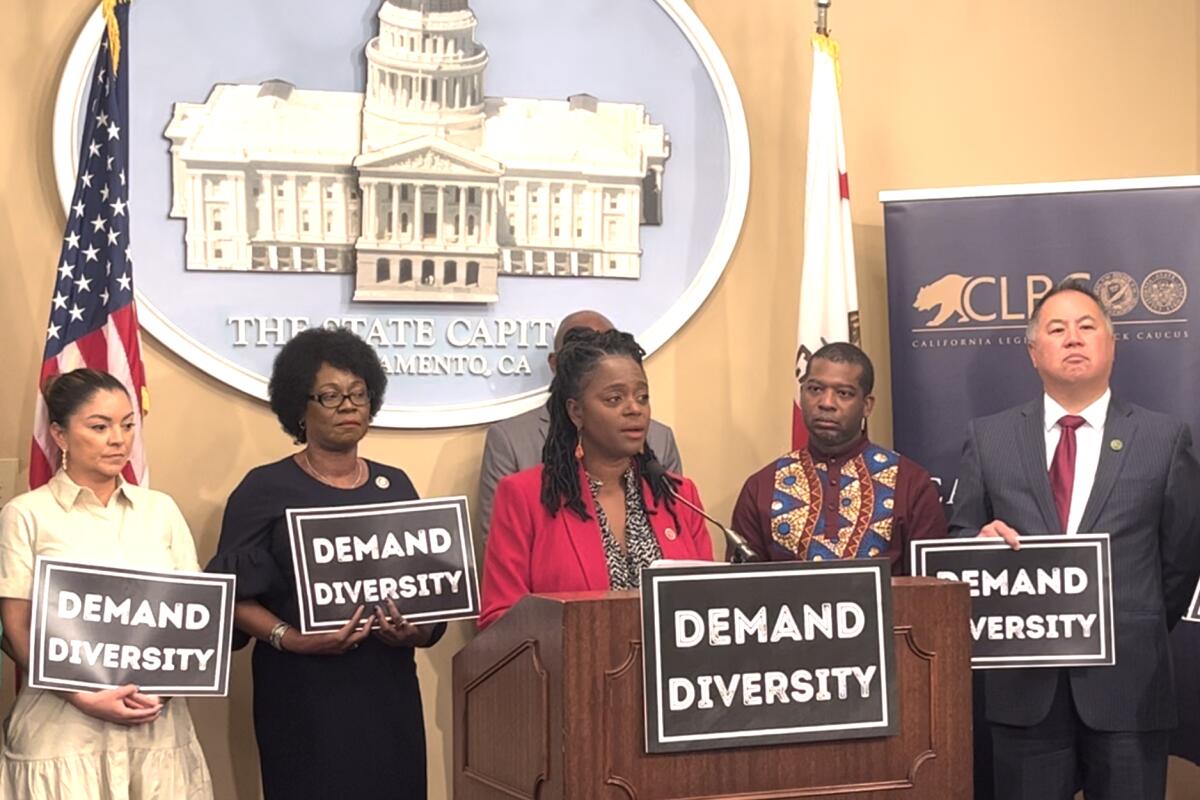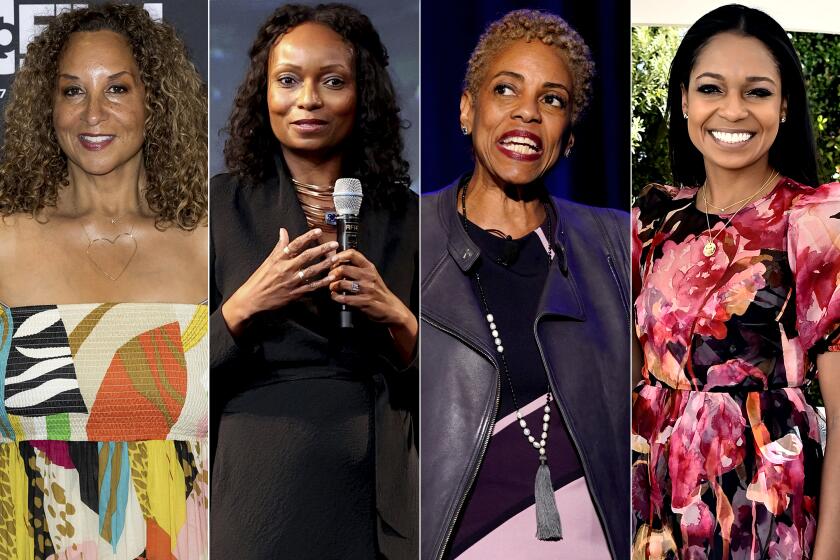California lawmakers want answers after exit of Black Hollywood female executives

- Share via
SACRAMENTO — California lawmakers on Thursday said the departures of high-profile Black female executives in Hollywood are a “troubling pattern,” especially because the state has extended its film and television tax credits.
“It’s a pattern that conveys that the early progress that we have made together with that industry to ensure diversity, equity, and inclusion above and below the lines is now coming to a grinding halt,” Sen. Lola Smallwood-Cuevas (D-Los Angeles) said at a news conference held by the California Legislative Black Caucus.
Smallwood-Cuevas is among lawmakers pushing for more answers from film studios and Gov. Gavin Newsom, who on Monday signed into law a bill that extends the state’s $330-million-per-year film and television tax credits for five years to fiscal year 2030-31. The tax credits would create an estimated 60,000 jobs and $10 billion of investment. The Black Caucus said that in the coming months it’s planning to meet with the governor, film industry executives and labor partners to push studios to provide more data about their diversity efforts and deliver “real results.”
The call for action highlights the tensions between California lawmakers and film studios over the lack of diversity that has long plagued Hollywood. Concerns about diversity have only heightened after the U.S. Supreme Court in June struck down race-based affirmative action policies at colleges.
“It is a slap in the face of not only women. It’s a slap in the face for people of color,” said Assemblymember Mike Gipson (D-Carson).
Diversity efforts across various industries heightened after George Floyd’s murder in 2020, but Hollywood is still struggling to make its workforce more diverse. In 2022, white people accounted for 78% of the lead actors in the top movies released in theaters, up from 72.4% in 2019, a Hollywood diversity report from UCLA showed. At the same time, as Hollywood studios released fewer films in theaters, opportunities for people of color also dwindled.
Alongside conservative attacks on ‘woke’ entertainment, equity advocates call the departure of four key Hollywood diversity executives ‘frightening.’
Mass layoffs in various industries have also hit diversity, equity and inclusion jobs harder than others. Diversity and inclusion jobs could include roles that help improve a company’s culture through events, policies and projects. In December 2022, the rate at which employees in DEI roles left a company voluntarily or involuntarily was 33% compared with 21% for non-DEI roles, according to a study by Revelio Labs, a New York workforce intelligence company.
In June, four high-profile Hollywood executives who are Black women departed from major companies including Warner Bros. Discovery, Walt Disney Co. and Netflix. The exit of leaders who focused on diversity, equity and inclusion efforts sparked concerns from insiders and advocates that pledges to make Hollywood more diverse were just empty promises. Representatives for Disney, Netflix and Warner Bros. Discovery say their diversity efforts are genuine. The Motion Picture Assn. and the governor’s office didn’t immediately have a comment.
California’s film and television tax credits, which will be refundable starting in 2025, include diversity requirements, but some lawmakers say they’re not enough. For example, studios have to submit a diversity work plan that is “broadly reflective” of California’s population if they want the full tax credit. The tax credit recipients would report information to the California Film Commission, including about how the project met or made a good-faith effort to meet the diversity work plan. A diversity, equity and inclusion expert in the motion picture industry would also be added to the CFC board, under the legislation.
New legislation introduced Saturday would resolve Hollywood’s thorniest political fight in Sacramento
During negotiations for the film tax credits, Smallwood-Cuevas said she urged the film industry to adopt systems that measured workforce retention so lawmakers could track progress toward making Hollywood more diverse but film studios resisted the idea.
Lawmakers said they want to take legislative action to add tracking of this information to the film tax credit.
If the data show that Hollywood isn’t moving the needle when it comes to diversity, Smallwood-Cuevas said, lawmakers will have to rethink the state’s investments.
“I think it takes time to see these sorts of trends,” she said in an interview. “But what isn’t helpful is when the leadership of that work is completely erased.”
More to Read
Get the L.A. Times Politics newsletter
Deeply reported insights into legislation, politics and policy from Sacramento, Washington and beyond. In your inbox three times per week.
You may occasionally receive promotional content from the Los Angeles Times.













